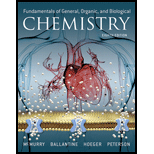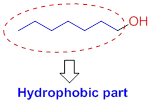
Concept explainers
Interpretation:
The solubility should be explained for the propanol is more soluble, whereas ethanethiol and chloroethane is slightly soluble.
Concept introduction:
Solubility of the alcohol in water:
The solubility of the alcohol is mainly depends on the hydrophilic part as well as length of the alkyl chain. If the compound has more number of hydroxyl group or less number of carbon chain which is soluble in water. If the compound has less number of hydroxyl group with more number of carbon chain which is insoluble in water because of hydrophobic part.
The carbon to oxygen ratio of 1:1 to 3:1 is soluble in water (such as methanol, ethanol, and propanol).
Alcohols have two different parts
- (1) Hydrophilic (water-loving),
- (2) Hydrophobic (water-fearing).
Hydrophilic (water-loving):
The compound has the hydroxyl group (

Hydrophobic (water-fearing):
The compound has alkyl chain group is called as hydrophilic.

Hydrogen bond:
The electrostatic attraction between a hydrogen atom and more electronegative atom such as nitrogen (
Want to see the full answer?
Check out a sample textbook solution
Chapter 14 Solutions
Fundamentals of General, Organic, and Biological Chemistry (8th Edition)
- Classify the monosaccharides. H-C-OH H. H-C-OH H-C-OH CH₂OH H-C-OH H-C-OH H-C-OH CH₂OH CH₂OH CH₂OH CH₂OH D-erythrose D-ribose D-glyceraldehyde Dihydroxyacetone CH₂OH CH₂OH C=O Answer Bank CH₂OH C=0 HO C-H C=O H-C-OH H-C-OH pentose hexose tetrose H-C-OH H-C-OH H-C-OH aldose triose ketose CH₂OH CH₂OH CH₂OH D-erythrulose D-ribulose D-fructosearrow_forwardFatty acids are carboxylic acids with long hydrophobic tails. Draw the line-bond structure of cis-A9-hexadecenoate. Clearly show the cis-trans stereochemistry.arrow_forwardThe formation of acetyl-CoA from acetate is an ATP-driven reaction: Acetate + ATP + COA Acetyl CoA+AMP+ PP Calculate AG for this reaction given that the AG for the hydrolysis of acetyl CoA to acetate and CoA is -31.4 kJ mol-1 (-7.5 kcal mol-¹) and that the AG for hydrolysis of ATP to AMP and PP; is -45.6 kJ mol-1 (-10.9 kcal mol-¹). AG reaction kJ mol-1 The PP, formed in the preceding reaction is rapidly hydrolyzed in vivo because of the ubiquity of inorganic pyrophosphatase. The AG for the hydrolysis of pyrophosphate (PP.) is -19.2 KJ mol-¹ (-4.665 kcal mol-¹). Calculate the AG° for the overall reaction, including pyrophosphate hydrolysis. AGO reaction with PP, hydrolysis = What effect does the presence of pyrophosphatase have on the formation of acetyl CoA? It does not affect the overall reaction. It makes the overall reaction even more endergonic. It brings the overall reaction closer to equilibrium. It makes the overall reaction even more exergonic. kJ mol-1arrow_forward
- Consider the Haworth projections of ẞ-L-galactose and ẞ-L-glucose shown here. OH CH₂OH OH CH₂OH OH OH OH ОН OH он B-L-galactose B-L-glucose Which terms describe the relationship between these two sugars? epimers enantiomers anomers diastereomersarrow_forwardClassify each characteristic as describing anabolism or catabolism. Anabolism Answer Bank Catabolism transforms fuels into cellular energy, such as ATP or ion gradients uses NADPH as the electron carrier synthesizes macromolecules requires energy inputs, such as ATP uses NAD+ as the electron carrier breaks down macromoleculesarrow_forwardThe table lists the standard free energies (AG") of hydrolysis of some phosphorylated compounds. Compound kJ mol-1 kcal mol-1 Phosphoenolpyruvate (PEP) -61.9 -14.8 1,3-Bisphosphoglycerate (1,3-BPG) -49.4 -11.8 Creatine phosphate -43.1 -10.3 ATP (to ADP) -30.5 -7.3 Glucose 1-phosphate -20.9 -5.0 Pyrophosphate (PP) -19.3 -4.6 Glucose 6-phosphate -13.8 -3.3 Glycerol 3-phosphate -9.2 -2.2 What is the direction of each of the reactions shown when the reactants are initially present in equimolar amounts? (a) ATP + H2O ADP + P (b) ATP + glycerol glycerol 3-phosphate + ADParrow_forward
- Characterize each term or phrase as pertaining to simple or facilitated diffusion. Simple diffusion Facilitated diffusion Answer Bank requires an input of free energy lipophilic molecules directly through membrane via channels polar molecules Na+arrow_forwardSort the descriptions into properties that describe either saturated phospholipids or unsaturated phospholipids. Saturated phospholipids Saturated and unsaturated phospholipids Unsaturated phospholipids Answer Bank have no double bonds in the fatty acid carbon chains have straight fatty acid tails have at least one double bond in the fatty acid tails have bent fatty acid tails are built upon a glycerol backbone make the membrane somewhat rigid at low temperatures allow the membrane to remain fluid and flexible at low temperatures fatty acid tails pack tightly together maintain some space between adjacent phospholipidsarrow_forwardPlace the events of an action potential in order, starting and ending with a cell at its resting membrane potential. Cell starts at its resting membrane potential. Cell returns to its resting membrane potential. Answer Bank K+ channels fully open, and Na+ channels are inactivated. K* rushes out of the cell, causing repolarization. K+ channels close slowly, resulting in hyperpolarization. Na+ channel gates reset. Fast Na+ and slow K+ channels are activated. Na rushes into the cell, causing membrane depolarization. Ligand activation of the acetylcholine receptor depolarizes the membrane.arrow_forward
- Glucose and fructose are reducing sugars. Sucrose, or table sugar, is a disaccharide consisting of both fructose and glucose. Is sucrose a reducing sugar? Why or why not? No, because only one anomeric carbon is involved in the glycosidic linkage. No, because both anomeric carbons are involved in the glycosidic linkage. Yes, because the fructose unit can convert to the open-chain form. Yes, because the glucose unit can convert to the open-chain form. Which statements about reducing sugars are true? The oxidation of a reducing sugar forms a carboxylic acid sugar. D-Arabinose (an aldose) is a reducing sugar. Reducing sugars contain keto groups instead of aldehyde groups. A disaccharide with its anomeric carbons joined by the glycosidic linkage cannot be a reducing sugar. A reducing sugar will not react with the Cu² + in Fehlings's reagent.arrow_forwardExamine the pairs of molecules and identify the more-reduced molecule in each pair. H-C- CH, OH CH HO-C-H CH₁₂ Pyruvate Ethanol Acetaldehyde Lactate COO H-C H H- -C-H COO- Succinate Fumarate -OOC COO H COO- H――000- CH₂ COO- Oxalosuccinate H-C-OH OOC-C-H CH₂ COO Isocitratearrow_forwardClassify each description as characterizing facilitated diffusion, primary active transport, secondary active transport, or both primary and secondary active transport. Facilitated diffusion Primary active transport Secondary active transport Primary and secondary active transport Answer Bank requires ATP includes lactose permease directly uses ATP hydrolysis to pump substances across the membrane includes the Na+-K+ ATPase pump always moves more than one substance at a time movement of substances against an electrochemical gradient does not require energy input includes uniporters uses energy stored in electrochemical gradients generated by pumpsarrow_forward
- Essentials of Pharmacology for Health ProfessionsNursingISBN:9781305441620Author:WOODROWPublisher:CengageSurgical Tech For Surgical Tech Pos CareHealth & NutritionISBN:9781337648868Author:AssociationPublisher:Cengage
 Anatomy & PhysiologyBiologyISBN:9781938168130Author:Kelly A. Young, James A. Wise, Peter DeSaix, Dean H. Kruse, Brandon Poe, Eddie Johnson, Jody E. Johnson, Oksana Korol, J. Gordon Betts, Mark WomblePublisher:OpenStax College
Anatomy & PhysiologyBiologyISBN:9781938168130Author:Kelly A. Young, James A. Wise, Peter DeSaix, Dean H. Kruse, Brandon Poe, Eddie Johnson, Jody E. Johnson, Oksana Korol, J. Gordon Betts, Mark WomblePublisher:OpenStax College





